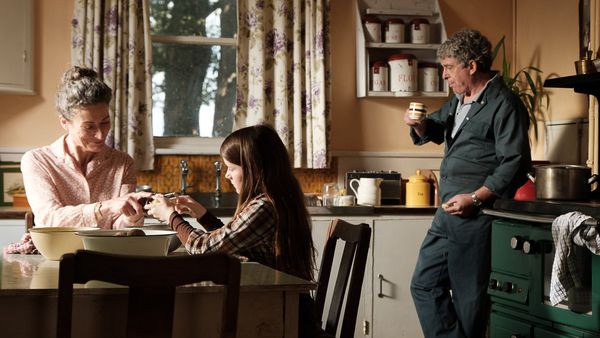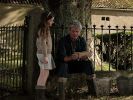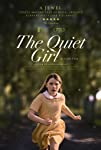Eye For Film >> Movies >> The Quiet Girl (2022) Film Review
The Quiet Girl
Reviewed by: Anne-Katrin Titze

It is the core of fairy tales, ancient and true, that wounds can heal, that change is possible, that goodwill and benevolence and honesty can lead the way to preternatural recovery. And sometimes a gate that needs to be opened and closed is all that stands between doom and a happily ever after - that is if you are well-prepared and up to speed to take on the challenge.
Colm Bairéad’s superb first feature, The Quiet Girl (Oscar shortlisted in the International Feature Film category, Ireland’s first such honour), is one of the best films of the year. Based on Claire Keegan’s story, Foster, it tells the tale of Cait (magnificent newcomer Catherine Clinch), a young girl in the rural Ireland of about 40 years ago, whose large family sends her off to distant relatives (Carrie Crowley and Andrew Bennett as the Cinnsealachs), virtual strangers, to spend the summer while her mother (Kate Nic Chonaonaigh) gets ready to give birth to her sixth child in their already too crowded, filthy, poverty-stricken household. Cait’s surly father Dan (Michael Patric) one night tells his wife that “they can keep her as long as they like.” Cait overhears the conversation. Equivalent to Hansel and Gretel’s classic call to adventure it is every child’s nightmare scenario come true - your parents want to get rid of you. As in the fairy tale, food and feeding the family plays an integral part. The difference is that Cait is alone and what awaits her is as far from a witch’s house as it can get.

While her little brother screams non-stop, her three older sisters discuss that the baby and a calf on the farm will be born the same week and they exchange theories on how the calf got into the belly in the first place. As Don DeLillo and Noah Baumbach in his adaptation of White Noise suggest, the family here as well is the cradle of misinformation.
The beautiful lush landscape (cinematography by Kate McCullough) of Ireland and well-chosen close-ups of objects of daily life - a bucket, a lunchbox, worn sandals - are accompanied by a soundtrack (by composer Stephen Rennicks) as perfect as a spring day when the air temperature feels so right that you don’t even notice it. This in itself would make the film outstanding, let alone that the majority of spoken words is in a tongue on the brink of extinction. Despite being the country’s official language, Irish Gaelic is spoken by fewer and fewer people and has been put on UNESCO’s endangered list. Yet it is the superb acting and the mastery and the pace of telling a story so important and universal that touches most deeply.
Goodness and badness are set in motion, rather than explained. Hints at Cait’s father’s infidelity, his alcoholism, gambling addiction, and overall deep disappointment and anger at his life which he takes out on those around him are presented from a child’s perspective. This is not an easy task that here comes across as utterly convincing. A conversation about secrets at one point in the film, indicating an even more troubling offense haunts us.
There are silences and there are silences, just as there are daddies and there are daddies. Dan drives Cait to his wife’s aunt’s house, three hours away and immediately upon arrival we know the girl’s life is about to change. Eibhlin (in a wonderfully warm and wise portrayal by Carrie Crowley) sees the girl’s state and through careful questioning opens up more and more about her and to us as well. We are with both of them, and it is a great place to be. Their delicate getting to know each other is a marvel and at first her husband Sean (Andrew Bennett whose performance is most transformative) seems a bit brusk and unsure if the invite had been a good idea.
This is a picture about top-notch parenting, and its opposite. It is supremely hopeful about what can be overcome with love and care, by openness and listening to a child. Nurture in nature is key. The girl is quiet for a reason, but as Sean so eloquently tells a nosy neighbour “She says as much as she needs to say. May there be many like her.” Úna (Joan Sheehy), said neighbor, full of spite and anger herself, spills the beans to Cait after a wake about the room with the train wallpaper and the pants and little plaid flannel shirts and Wellies that the girl had been wearing ever since her father left, forgetting the suitcase with her own clothes in the car. A lovely dress shopping trip to the village will make up for it.
Two departure scenes are set up as contrasting mirror images. Dan stubs out his cigarette on the food plate that Eibhlin had prepared for lunch during his brusk handoff of Cait and drops - in a gesture so passive and violent and filled with unjustified pride that it makes your blood boil - a third of the stalks of rhubarb on the floor that were given to him as a gift for his wife. It is Sean who picks them up. A moment later, we see Dan toss them carelessly on the seat of the car. The immense damage this man has done to his child is what needs to be undone.
The summer progresses and Cait learns how to vacuum and peel potatoes and make red-gooseberry jam. She and her foster mother fetch water from an enchanting well in the forest, she gets her long hair brushed 100 times, takes hot baths, and scrubs her toes clean. “All you needed was some minding” says Eibhlin, every child does.
With Sean she learns to use her long legs to run fast as the wind. A cookie left for her on the counter, the buttoning up of a coat, small gestures speak volumes, as they do in life. When Sean takes her along to feed a very lovely calf, Cait’s questions are more than logical, they expose in one simple scene the perverse nature of the dairy system prevailing to this day. “Why don’t we drink the powdered milk and leave the cows to drink their own?” Exactly.
The shift in silences between two people in various scenes and the stark contrast in emotion is thrilling. Quiet can be unbearable and a harbinger of happiness. Needs, care, kindness are words that are easily thrown around, emptied out or dismissed in this world that is so full of mean spirited arrows targeting the most vulnerable in order to make them hard and cruel too. It is easy to turn the good into a negative and the poison spreads.
Witches and ogres are everywhere, disguised as parents or politicians, you name it. “Strange things happen sometimes” says Sean one night by the sea in the context of the story of a lost colt that was being rescued from the ocean and got up miraculously on the beach, “suddenly revived, perfect, good as new.”
Reviewed on: 13 Jan 2023














